Listening report: August 2012
← All Hallow's Listen Part 2: Dave reviews Shadow Show: All-New Stories in Celebration of Ray BradburyScalzi's The Human Division Audiobook to be Serialized? →
Listening report: August 2012
Posted on 2012-10-22 at 20:33 by Sam
After seven audiobooks in July, three excellent, I managed just six in August, with one absolutely year’s-best fantastic (The Drowning Girl by Caitlin R. Kiernan) another excellent (non-fiction, How to Build an Android), and three more well worth the listen, including science fiction (Chimera), fantasy (A Book of Tongues), and a collection (Fragile Things).

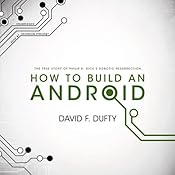
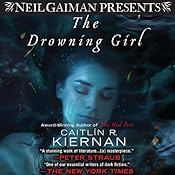
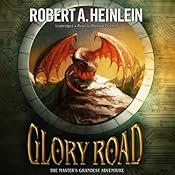
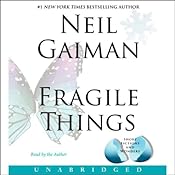
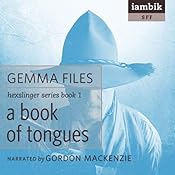
REVIEWS: (Caveat from the last two “monthly” reports also applies here; fairly off-the-cuff reviews, trying to claw back to the present and, you know, not be 2 months behind in reviews any more.)
(Caveat from the last two “monthly” reports also applies here; fairly off-the-cuff reviews, trying to claw back to the present and, you know, not be 2 months behind in reviews any more.)
- Chimera: The Subterrene War, Book 3 By T. C. McCarthy, Narrated by John Pruden for Blackstone Audio -- One by one, the novels of The Subterrene War have zoomed out, and out, and out. In Germline we had one of my favorite novels of 2011, a claustrophically close look at an embedded journalist in a near/near-medium future war in Kazakhstan. With Exogene we followed one of the genetically-engineered super soldiers, a young woman named Catherine, behind and around enemy lines into Russia, through nuke-scorched Korea, and into southeast Asia. With Chimera we finally get a look at life at what's left of the United States, through the eyes of Stan Resnick, a US operative whose missions focus on tracking down and "retiring" (executing) escaped Germline soldiers. It's not a pretty picture, and Resnick is not a particularly sympathetic character -- if anything, he's even less sympathetic than strung-out journalist Oscar Wendell from Germline. And that's saying something. In this post-nuclear-exchange United States, California (and more) are uninhabitable post-war wastelands; governments watch citizens via camera for signs of stress; women rent their wombs to populate the war effort; all in all, not a pretty place. Not quite, technically, a dystopia -- as it is not a fallen utopia -- but there's little difference on the ground. Resnick's own family life is also a mess, leaving him disaffected at home and only "at home" when on a mission. Assigned to a particularly challenging case, paired with a very reluctant co-assignee with aims on advancement but very little field experience, Resnick nonetheless find his way back to southeast Asia and the front lines, where advanced and advancing Exogene soldiers are rapidly changing the game, and a group of well-past-their-shelf-life Germline soldiers may be all that stands in their way. Meanwhile, Resnick is finally thinking about putting on the mantle of fatherhood he has long abdicated. Pruden's narration gives a properly rough edge to the unlikable Resnick, for whom I could not quite bring myself to root -- but that isn't quite the point, anyway.
- How to Build an Android: The True Story of Philip K. Dick’s Robotic Resurrection By David F. Dufty, Narrated by Bronson Pinchot for Blackstone Audio (review copy) -- PKD isn’t the only sf reference here; Asimov is of course mentioned, including a verbatim reading of his “three laws” of robotics. Name checks of Poul Anderson, Brian Aldiss, etc. particularly in documenting one of the researcher's "addiction" to reading and re-reading sf novels. Detailed story of Alan Turing, Enigma, and the Turing machine and Turing test -- the latter paper cross examined by PKD in Do Androids Dream of Electric Sheep, the basis of Blade Runner. Amazingly clear narration, an eye-opening performance for me on top of the wonderfully characterized On Stranger Tides. Overall just a really interesting and well told and well narrated story here of a fascinating project in (soft) AI and (high end) robotics, populated with encounters with university presidents, PKD's family, fans, robotics expos, and of course the sordid tale of dealing with lost baggage claims.
- The Drowning Girl By Caitlin R. Kiernan, Narrated by Suzy Jackson for Neil Gaiman Presents -- As of finally writing this review in mid October, my pick for the year's best new speculative fiction novel of 2012. The Drowning Girl explores the edges between ghosts, art, and insanity, through the narrative device of a young schizophrenic woman's typewritten letters to herself. Jackson's narration suited me just fine, particularly her characterizations of Imp and even more so of her lover, Abalyn. I find it interesting that one of my favorite novels of last year, Among Others by Jo Walton, took a similar tack between reality and fantasy (both can have fully mimetic readings in my opinion) using a similar device (Walton's novel was a series of diary entries from a young Welsh girl). Both novels really fascinated me on that aspect of examining my assumptions of genre fiction, reliability of narration -- particularly with the tactile story within a story that is the nearly shared narrative device. If anything, Kiernan takes this to another level here, with the diarist herself questioning her clearly suspect sanity, with explicit references to starting and stopping the journal, with layer upon layer of fact vs. truth (a common theme of Kiernan's dark and beautiful oeuvre, from her Alabaster: Wolves comics to her prose fiction) and questions of memory, of what a story can do, of what a haunting is, if it is indeed anything. Somehow I haven't managed to say much yet about what this particular story is about... of course there are summaries and reviews a plenty. In compressed brevity: India Morgan Phelps (Imp) has clashing memories of two young women both named Eva Canning, and is haunted by and creates dark, brooding Bostonian paintings. The voice of the novel was amazing and Jackson did a great job of capturing Imp's self-questioning, slightly mangled brilliance. Also! (Yes, there's more.) It was a marvelous portrayal both of Imp's schizophrenia and of Abalyn, a young transgender woman who reviews video games and falls for and is frightened by Imp. In summary: read or listen to this book. It's really, really good.
- Glory Road By Robert A. Heinlein, Narrated by Bronson Pinchot for Blackstone Audio (review copy) -- I can't fault anything about Pinchot's narration, as again I have had my eyes opened this month on his versatility and range across multiple fiction styles and narrative non-fiction. And I have great affection for Heinlein, author of the first "real" book I remember reading (Space Cadet, one of his juveniles) and one of my all-time favorite sf novels (The Moon is a Harsh Mistress). While Glory Road didn't rise to that level for me, it was interesting to finally read Heinlein's fantasy novel. The novel stars one E.C. Gordon, veteran of an unnamed war in South-East Asia, though it feels right to think of it as early US involvement in Vietnam. We spend some time getting to know Gordon through his hustling for transports and lottery tickets on his way to Europe, where he hopes to go to university on the GI Bill, but being denied that decides to just hang about in southern Europe for a while. He responds to a newspaper advertisement and meets the beautiful and, as we'll soon find out, alien Star, and her assistant, Rufo, and agrees to undertake a quest to save the galaxy. Here a note on the narration: I found Pinchot's mainline narration quite well adapted to the text, and his strongly accented Rufo was brilliant and a joy to hear. But his Star was weak and for me far too softly voiced, which combined with Gordon's chauvinistic dominance of her in the text to deflate comparisons to Heinlein's stronger women in later works such as Wyo in The Moon is a Harsh Mistress. The sf world of gate-connected mostly humanoid aliens is also much "softer" and less fully realized than Heinlein's other, generally harder sf settings. (Other than of course the mysticism in Stranger in a Strange Land.) Heinlein takes his science less seriously here, but doesn't throw everything out -- there are some physical constraints on these gates for example. Much of the fantasy worlds encountered by Gordon (who comes to be called "Oscar" by way of an interrupted turn of phrase) are fairly preposterous as well, though a bit less so in the final balance as we find out just how advanced these societies are how intentional their settings are. But in the balance: preposterous, with suspensions of one's suspensions of belief a-plenty. Which suits the whimsical nature of the book, I suppose. There is, however, a brilliantly done fencing match, one of the best-described exchanges of steel I can recollect encountering, and an ending which interrogates the role of the conquering hero in peacetime. Overall I can't give the book an earnest recommendation, but certainly a well-produced audiobook that should more than satisfy Heinlein fans other than the oddly too-quiet, too-soft characterization of Star.
- Fragile Things By Neil Gaiman, Narrated by Neil Gaiman for Harper Audio -- I've listened and re-listened to so many audiobooks by and read by Gaiman-- including several stories in this collection -- that even this excellent, excellently-read collection has trouble standing out until I really tried to place it in context for this review. From the Sherlock Holmes and Lovecraft fusion "A Study in Emerald" through darker, lighter, shorter, and longer pieces, it's a marvelous snapshot of Gaiman's short fiction of (primarily) the early 2000s. I was surprised to find quite a few I had not previously encountered -- my final thought upon finishing the audiobook was "how did I not know about this American Gods novella?" I'm always a fan of well-done author narrations, and Gaiman is of course one of the best of these; a natural storyteller with more than enough accents and characterizations at his disposal to bring stories to rich life. One story in particular which I hadn't read before and which really struck me in this collection was "Good Boys Deserve Favors", a story of a student of the bass viol and the magic which transpires when a musician is matched with the right instrument.
- A Book of Tongues: Hexslinger, Book 1 By Gemma Files, Narrated by Gordon Mackenzie for Iambik Audio -- Series: Hexslinger, Book 1 -- I had been listening in bits and pieces the past couple of months between and around books, but finally found plenty of time for A Book of Tongues this month. This is a very intriguing and dark "weird western", a world of fallen preachers, Pinkerton agents, hangman's nooses, post-Civil War frontier action, and ancient Mesoamerican religions and "hexation" -- the arising of magical powers. (And also gay sex -- it's no Delany's TVNS by any means, but there is some fairly explicit man on man action along the way.) Reverend Asher Rook is -- or at least was -- a Confederate chaplain, who comes into his hexation upon being hanged for shooting the troubled officer in command of the regiment to which he is attached. Actually, the shooting had been done by Chess Pargeter, a preternaturally skilled killer of men as well as a paramour to no small number in the regiment. Drawn by troubling dreams he cannot shake, Ash finds his way into the world of hexes (for Ash, this comes in the form of quoting Biblical verses and summoning plagues, pestilences, pillars of salt, etc.), building a gang of thieves around him with Chess as his right-hand man. Around and into this band is sent Pinkerton agent Edward Morrow, not to kill Ash or Chess but instead to discover the limits, if any, of Ash's power. The story is told in a non-linear way, introduced in a "present" time of Morrow as part of the gang, flashing back to events previous, and back to the "present" as we find out how far Ash will go, how far Chess will go, and how far Morrow will go to follow them, into darkness and death and desolation. As the first book in a trilogy, A Book of Tongues is contained well enough but clearly leading into book 2. It's also quite ably narrated, though not a 110% clean production, as some recording sessions had more echo, less headroom, etc. but very well characterized, with variations on accents, gruffness, populating the story with a good variety of voices.
Reading wise, it was actually some comics titles that had my “sit and read” attention in August: Alabaster: Wolves, Hawkeye #1, and the first three issues of The Massive.
September plans: Well, it being mid October, I know what I did in September. Mostly. Listening wise, it was the rest of The Graveyard Book, Light by M. John Harrison, Swordspoint by Ellen Kushner, The Age of Miracles by Karen Thompson Walker, and the beginning of Vellum by Hal Duncan, along with sneaking in some more podcasts, including Jeff VanderMeer’s novella “The Cage” on PodCastle which I am totally counting as an audiobook, because, hey, it is.
